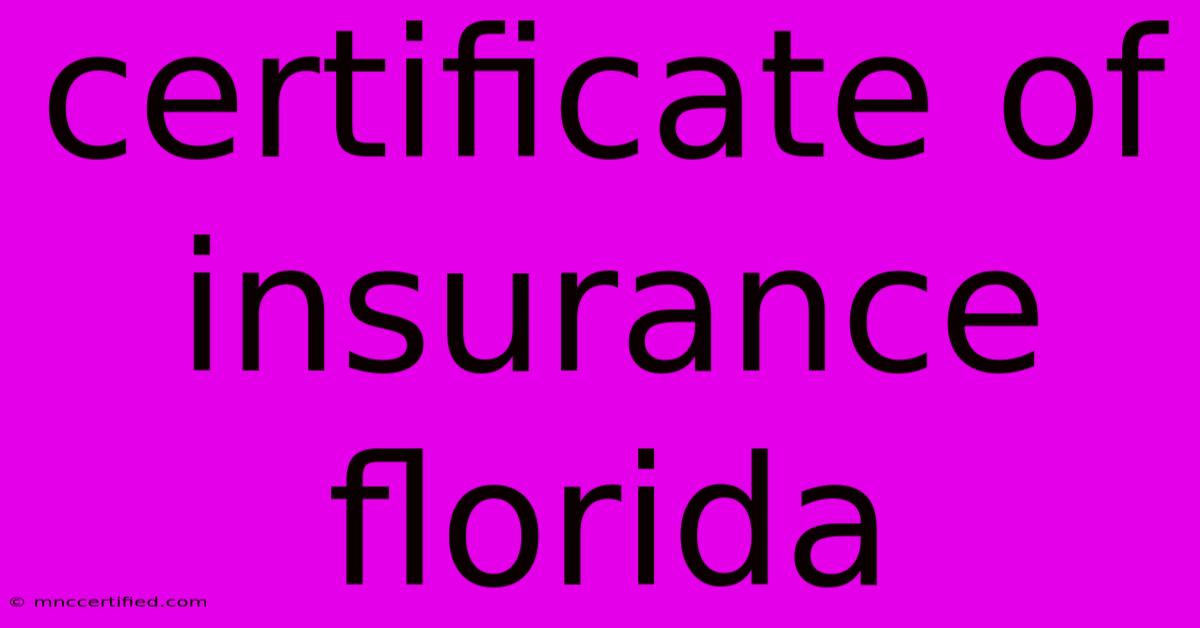Certificate Of Insurance Florida

Table of Contents
Demystifying the Certificate of Insurance in Florida: A Comprehensive Guide
Finding the right insurance coverage can be tricky, especially in a state as diverse as Florida. One crucial document often required for businesses and individuals is the Certificate of Insurance (COI). This article will provide a comprehensive guide to understanding Florida's COI requirements, its importance, and how to obtain one. We'll cover key aspects to ensure your understanding is complete and accurate.
What is a Certificate of Insurance (COI)?
A Certificate of Insurance (COI) isn't insurance itself; it's a formal document that verifies that an insurance policy exists. It acts as proof that a specific individual or business holds the necessary insurance coverage, providing crucial details about the policy and the insurer. Think of it as a summary of your insurance policy's key information, specifically tailored for a third party requiring proof of coverage. This is critical in Florida, where various industries and contractual agreements often mandate the presentation of a valid COI.
Why is a Florida COI Important?
In Florida, a COI is frequently requested for a variety of reasons:
-
Contracts and Agreements: Many commercial contracts, leases, and permits in Florida require proof of insurance. This safeguards all parties involved, ensuring that financial responsibility rests with the insured party in case of an incident. Landlords might request a COI from tenants, while contractors need one to secure projects.
-
Protecting Your Business: Having a COI readily available protects your business from potential liability issues. It demonstrates your commitment to responsible risk management and can help mitigate legal and financial risks. A missing or invalid COI can lead to contract breaches and other serious consequences.
-
Meeting Legal Requirements: Certain Florida industries and professions require COIs to comply with state regulations. This could range from construction and healthcare to transportation and event planning.
-
Demonstrating Financial Responsibility: Presenting a COI shows potential clients or partners that you're a responsible and reliable business entity.
Key Information Included in a Florida COI:
A standard Florida COI usually includes the following critical information:
- Named Insured: The individual or business holding the insurance policy.
- Insurance Company: The name and contact information of the insurer providing coverage.
- Policy Number: A unique identifier for the specific insurance policy.
- Policy Effective and Expiration Dates: Specifies the duration of the insurance coverage.
- Type of Insurance: Clearly states the type of coverage (e.g., general liability, workers' compensation, auto liability).
- Limits of Liability: The maximum amount the insurance company will pay for covered losses. This is a crucial piece of information.
- Additional Insured (if applicable): Specifies any other parties protected under the policy.
Missing or inaccurate information can invalidate the COI, leading to potential complications.
Obtaining a Certificate of Insurance in Florida:
The process of obtaining a COI is typically straightforward. You should contact your insurance agent or broker. They can usually generate a COI on your behalf, often digitally, saving you time and effort. You can also often access COIs through your insurer's online portal. Remember to verify the information for accuracy before sharing it.
Common Mistakes to Avoid:
- Outdated COIs: Always ensure your COI is current and reflects your active insurance policy.
- Inaccurate Information: Double-check all details for accuracy to avoid discrepancies.
- Failure to provide timely COIs: Delays can lead to contract issues and lost opportunities.
Beyond the Basics: Understanding Florida-Specific Insurance Requirements
Florida has specific insurance regulations impacting various industries. For instance, contractors often need specific liability coverage, while healthcare providers face different requirements. Understanding your specific industry’s insurance requirements is vital to obtaining the appropriate COI. Consult with an insurance professional to ensure full compliance.
By understanding the intricacies of the Certificate of Insurance in Florida, businesses and individuals can ensure they are protected and compliant. Remember, a well-maintained and accurate COI is a valuable asset, safeguarding your interests and facilitating smooth business operations.

Thank you for visiting our website wich cover about Certificate Of Insurance Florida. We hope the information provided has been useful to you. Feel free to contact us if you have any questions or need further assistance. See you next time and dont miss to bookmark.
Featured Posts
-
Liam Payne Funeral One Directions Tribute
Nov 21, 2024
-
How Much Is A Bottle Of Opus One
Nov 21, 2024
-
Liquor Liability Insurance Texas
Nov 21, 2024
-
24 75 An Hour Is How Much A Year
Nov 21, 2024
-
Aml Insurance Company Houston Tx
Nov 21, 2024